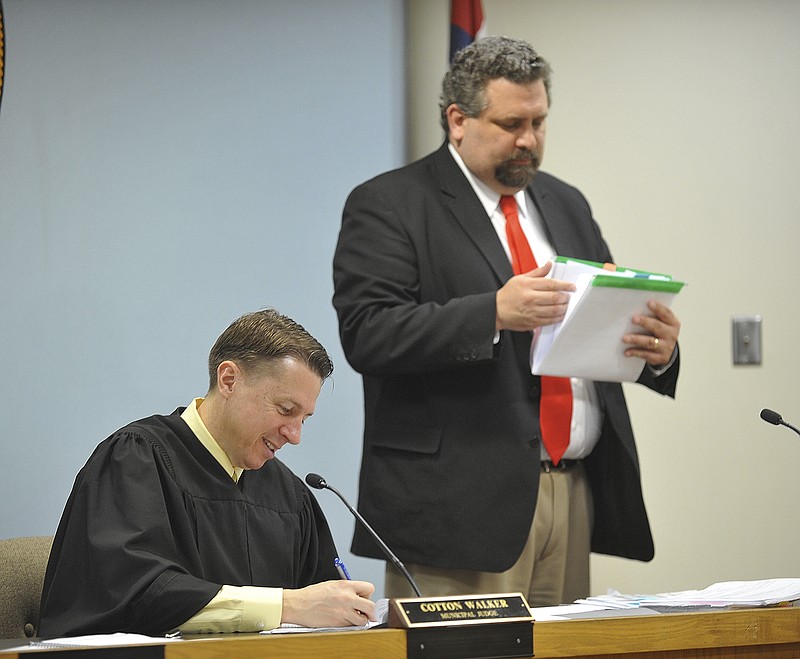The law changing Missouri municipal court operations went into effect last Friday, and some courts - especially in the St. Louis area - already are seeing changes.
"For our court, the changes are mostly the reporting requirements to the auditor's office and to the Department of Revenue," Jefferson City Municipal Judge Cotton Walker said Wednesday.
A Revenue department news release said thousands of drivers licenses were reinstated under the reforms. The new law prohibits courts from suspending drivers licenses for failure to appear in court or failure to pay a fine for a minor traffic violation.
But, Walker said, that doesn't affect Jefferson City's court.
"We have not been sending "Fact-Suspension' warrants, which is the failure to appear on a minor traffic violation," he said. "Our court has not done that for years, even though it was in the statutes - because we did not feel like it was the right way to deal with it."
The new law requires a more defined process for issuing arrest warrants for people who miss a court appearance, but Walker said Jefferson City's court has to make just a minor adjustment to its existing policy.
"We already were sending a courtesy letter, with a notice saying, "A warrant will be issued if you don't appear at the next court date,'" Walker said. "We modified our practice, slightly, to give an extra week in there - but that was, really, just being over-careful, since we were already sending out a notice on your failure to appear ... on minor traffic violations."
The new law lowers the percentage of annual general operating revenue that cities, towns, villages, and counties are allowed to retain from minor traffic violations - and requires the local governments to pay the Revenue department any money received in excess of these statutory limits.
But, Walker said, Jefferson City's revenues from those cases is about 3 percent of the total income - well below the new law's limits.
The new law requires municipal courts to be more open about their process and make sure people ordered to go to court have been told their rights.
"I did issue a new court operating rule, to make it clear ... that this what we do and this is what we don't do," Walker said. "One of the things I started when I was elected here (in 2011) was scrolling everybody's rights on arraignment" onto the courtroom's walls.
Court Marshal Robert Cynova makes sure people are told to read that information before they're called up to meet with the judge.
Walker said some of the folks complaining about operations in St. Louis County's various municipal courts have suggested metropolitan area judges look to Jefferson City's court as an example of the "right way" to do things, because "the basic rights and the process are here."
He's a board member of the statewide Missouri Municipal and Associate Circuit Judge Association, and has met several times with municipal court judges in the St. Louis area.
Ultimately, Walker said, the new law will create more headaches for the Jefferson City's Municipal Court's clerks and other staff than for the people appearing in the courtroom.
Auditor on watch
State Auditor Nicole Galloway this week announced her office is taking additional steps to monitor court reform efforts, including expanding the "Municipal Courts Initiative" started last October by then-Auditor Tom Schweich.
The standard audit process already includes reviews of financial transactions, accounting practices and compliance with court rules and the law.
Under the initiative, auditors place a larger emphasis on examining statistical information on warrants, tickets and other penalties, and investigating activities related to unfair treatment and other practices that may impair impartiality or damage the court's credibility with citizens, Galloway said in a news release.
Her staff has proposed some new rules affecting municipal courts, and will hold a Nov. 2 public hearing on the proposals in Jefferson City.
The proposals are available online, at auditor.mo.gov/News/vNews.aspx?id=983.
Public comments also can be made by mail or email, and will be taken through Nov. 6.
High court group will weigh in, too
Missouri's Supreme Court also has a "work group" looking at municipal courts, with a Dec. 1 deadline for issuing its final report.
The work group is planning three public hearings this fall in St. Louis, Kansas City and Springfield, with dates and times still to be determined.
Among its list of a dozen issues for possible review, the group's interim report cited "conflicts of interest by judges and staff serving multiple municipal division roles" in different courts; consolidation of municipal divisions; increasing public understanding of court processes; and alternatives to monetary sanctions and use of diversion.
Walker said he's already doing some of that last idea - for some people who can't afford to pay their fines, he's arranged community service jobs with Jefferson City's parking and Parks, Recreation and Forestry departments.

